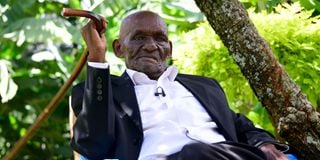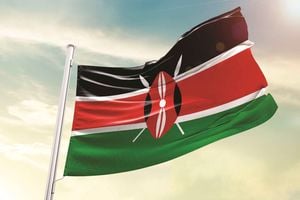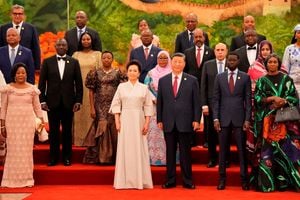
The 92-year-old Ndwiga Muruathika, a self-confessed hitman at his home in Runyenjes, Embu County during the interview.
The DCI said they will go for Ndwiga Muruathika, who confessed in a Nation interview on Saturday that he bought the pistol that was used to assassinate Tom Mboya. The confession makes Mr Muruathika an abettor, a co-conspirator, a partner in crime, who can be prosecuted.
But Mr Muruathika is 92 years old. Mboya was assassinated 55 years ago. Nahashon Njenga, who shot Mboya, was convicted of the murder and sentenced to death. The file was closed.
However, the police have said: “The attention of the Directorate Criminal Investigations has been drawn to an article published in the Saturday Nation dated 6th July, 2024…The DCI has initiated an investigation and necessary action will be taken once the investigation is complete.”
Criminal cases have no time limitation. The Mboya murder case can be re-opened. Mr Muruathika can be prosecuted as a conspirator and if found guilty can be imprisoned for 14 years. He also said in the interview that he was one of the three Kanu youth wingers tasked with killing Mboya. He, therefore, may also be liable as an accessory and if found guilty he can be imprisoned for life.
Did Mr Muruathika know what he was doing when he gave that interview in which he confessed he was a gun runner and hitman? Did he understand clearly the consequences of the interview? Did the interviewer owe him a duty of care?
The Saturday Nation interview, “I bought pistol that killed Mboya, man aged 92 now claims,” was also published in Taifa Leo and Nation.Africa, broadcast by NTV, and re-published by other media. It was one of the most widely read and viewed interviews. It gave Mr Muruathika a chance to share his story.
Public interest
The interview also served the public interest by shedding light on a historical event that has been clouded by conspiracy theories. Its publication promoted accountability and stimulated public debate.
The interviewer, Duncan Khaemba, the NMG senior political reporter, deserves praise for the considerable ingenuity he employed in doing the interview. His accompanying long-form analysis in the Saturday Nation and Nation.Africa, “Unanswered questions on assassination 55 years on,” complemented well the interview.
My only concern is that although he worked on it “for the last eight months”, he only quotes four live sources of information. They are former Kangema MP Muturi Kigano, Cotu Secretary-General Francis Atwoli , Mboya’s neighbour in Rusinga Island Ochieng’ Oraya and his cousin Peter Odede. And he over-relied on Mr Kigano who in turn relied mainly on what other people had told him.
But I digress. Did Mr Khaemba owe Mr Muruathika a duty of care? Journalists have an ethical responsibility to treat with consideration the people they interview who are not media-savvy. They should consider the potential harm or distress that their questions or reporting might cause to the people they interview.
Does this mean that journalists should suppress information if it’s deemed harmful to the interviewee? While it’s true that journalists should strive to report the truth and provide important information to the public, they also have an ethical responsibility to ensure the safety and well-being of their sources.
Sensitive details
In cases where the disclosure of certain information could potentially cause harm to the interviewee, journalists should carefully weigh the potential benefits of publication against the possible risks. This may involve seeking the interviewee’s consent to publish the information, redacting sensitive details, or in some cases, deciding not to publish the information at all.
However, it’s important to note that the decision to suppress information shouldn’t be taken lightly. It should only be made after careful consideration of the facts and ethical principles at stake. Ultimately, the goal should be to strike a balance between the public’s right to know and the interviewee’s safety.
In the case of Mr Muruathika, the second factor to consider is the public interest in prosecuting a person of such advanced age. But this lies with DCI, not Mr Khaemba.
In conclusion, it’s fair to say Mr Khaemba might have had a moral duty to explain to Mr Muruathika the consequences of his confessions. But would Mr Muruathika have made use of the advice? It’s not clear. He is quoted saying that he doesn’t want to go to the grave with some deep dark secrets.
The Public Editor is an independent news ombudsman who handles readers’ complaints on editorial matters including accuracy and journalistic standards. Email: [email protected]. Call or text 0721989264










